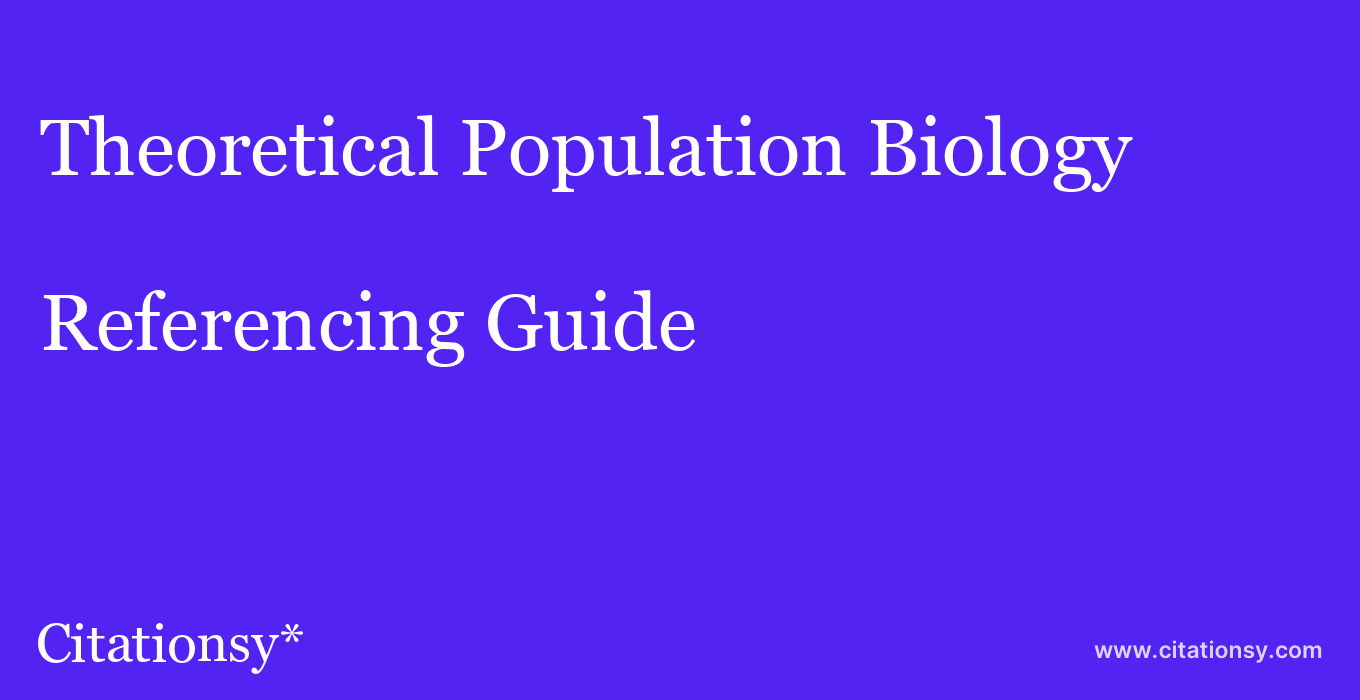Theoretical Population Biology Referencing Guide
(updated Apr 2024)
Last updated:
How to do citations in Theoretical Population Biology style?
This is the Citationsy guide to Theoretical Population Biology citations, reference lists, in-text citations, and bibliographies.
Automate citations and referencing with our tool, Citationsy. It’s free to try and over 400 000 students and researchers already use it.
This is the Citationsy guide to Theoretical Population Biology citations, reference lists, in-text citations, and bibliographies.
The complete, comprehensive guide shows you how easy citing any source can be. Referencing books, youtube videos, websites, articles, journals, podcasts, images, videos, or music in Theoretical Population Biology.
Click here to give it a try.

How do you cite a book in the Theoretical Population Biology referencing style? (2024 Guide)
Books are written works or compositions that have been published, many of which might be in digital version. Here’s how to cite a book in Theoretical Population BiologyHere’s an example book citation in Theoretical Population Biology using placeholders:
Last Name, F.N., 2000. Title, Edition. ed. Publisher, City.
Theoretical Population Biology citation:
Angelou, M., 1969. I Know Why the Caged Bird Sings, 1st ed. Random House, New York.
Automate citations and referencing in Theoretical Population Biology with our tool, Citationsy.
It’s free to try and over 400 000 students and researchers already use it.
Click here sign up
How to reference a journal article in the Theoretical Population Biology citation style?
How do you cite scientific papers in Theoretical Population Biology format?
Citing formats are used to recognize related literary pieces and to mention references used. To cite any paper in Theoretical Population Biology, follow these easy stepsHere’s a Theoretical Population Biology journal citation example using placeholders:
Author1 LastnameA.F., Author3 LastnameA.F., 2000. Title. Container Volume, pages Used. https://doi.org/DOI
Petit, C., Sieffermann, J., 2007. Testing consumer preferences for iced-coffee: Does the drinking environment have any influence? 18, 161-172. https://doi.org/10.1016/j.foodqual.2006.05.008
Automate citations and referencing in Theoretical Population Biology with Citationsy. Get started for free
How to cite a website in a paper in Theoretical Population Biology style?
The basics of a reference list entry for a web page or web document in Theoretical Population Biology is straight forward. Here’s howHere’s an Theoretical Population Biology example website reference:
Author1 LastnameA.F., Author2 LastnameA.F., 2000. Title [WWW Document]. URL https://www.example.com (accessed 4.23.2024).
https://www.theguardian.com/world/2008/nov/05/uselections20083
on The Guardian website:
Tran, M., 2008. Barack Obama To Be America’s First Black President [WWW Document]. URL https://www.theguardian.com/world/2008/nov/05/uselections20083 (accessed 4.23.2024).
Citing websites and links in Theoretical Population Biology is much easier with the Citationsy Chrome Extension →
Cite Theoretical Population Biology with Citationsy. Get started for free
How to cite a YouTube video Theoretical Population Biology in 2024
Citing a video from YouTube may appear more difficult than citing a book because YouTube has so much information. But the process is quite simple, here’s how to do it in Theoretical Population BiologyHere’s a Theoretical Population Biology citation YouTube video example:
ChannelName, 2000. Title [WWW Document]. YouTube. URL https://www.youtube.com/watch?v=XXXXXX (accessed 4.23.2024).
Pixar, 2015. Pizza Clip — Inside Out [WWW Document]. YouTube. URL https://www.youtube.com/watch?v=8W6rntBADUQ (accessed 4.23.2024).
How to cite a podcast using Theoretical Population Biology referencing style
Did you know there are over 50 million podcast episodes out in the world for you to listen to? If you want to cite one in Theoretical Population Biology, here’s howIt is becoming more and more common to reference podcasts in essays or other school work.
Here’s how to reference a podcast it in Theoretical Population Biology.
Lastname, F., 2000. Title.
This American Life, 2018. 640: Five Women.
Cite podcasts in Theoretical Population Biology with Citationsy, a referencing app used by over 400 000 students.
Get started for free
How to cite a piece of music or a song using Theoretical Population Biology referencing style?
Many people think that referencing songs or lyrics to songs isn’t common practise. That’s why we’re here to make it as simple and easy for you to reference a song in Theoretical Population Biology. This is all you needAn example song citation in Theoretical Population Biology.
Lastname, F., 2000. Song Title, Album.
The Beatles, 1969. Here Comes the Sun, Abbey Road.
You can automate citing and referencing any source in Theoretical Population Biology using Citationsy.
Cite sources using the Theoretical Population Biology Citation Machine
Cite Theoretical Population Biology with Citationsy, a referencing app used by over 400 000 students. Get started for free
 Sign in with Apple
Sign in with Apple account
account